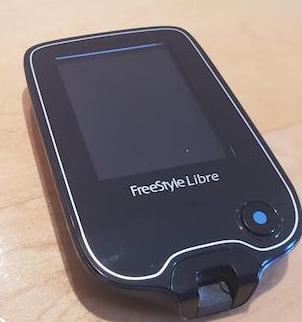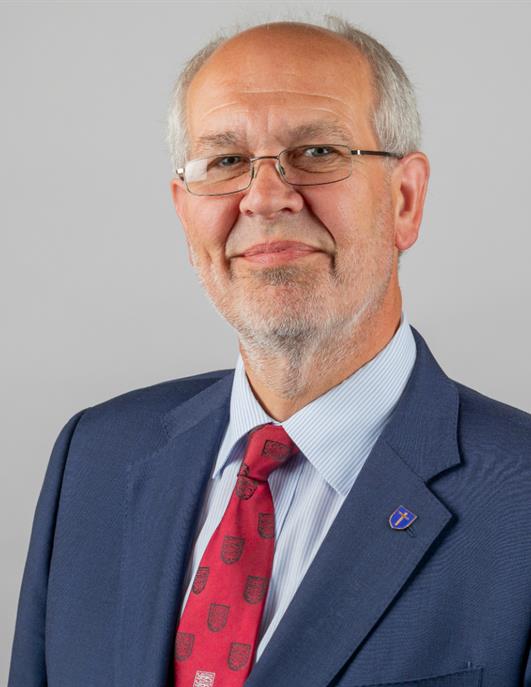

A Type 1 diabetic islander, who was refused funding for a specific type of glucose monitor he felt was necessary to manage his condition, has had a discrimination claim against the Health Minister thrown out.
The claimant argued that the Health Minister, Deputy Richard Renouf, was putting him at a disadvantage to people who do not have Type 1 diabetes by refusing to pay for a Dexcom CGM (continuous glucose monitor) for him.
The man, whom the Tribunal judgment said has had “a terrible time with his condition over the course of many years”, needs an inter-glucose monitor to manage his diabetes.
There are two types of monitor available: a CGM, which transmits data continuously and which alerts the user if their blood sugar levels drop too low or go too high, and a Flash product, which requires the user to swipe a reader across the sensor to check their glucose levels.

Pictured: The Health Department said they would only fund a 'flash' monitor.
The claimant has been using a CGM meter for a while following medical advice and paid for it himself. He said it had made a “significant difference to his life”, noting how the alarm enabled him to safely manage his diabetes when his sugar levels dropped. He described the change as “amazing”, as he had been able to avoid the emergency treatment that had been a regular feature of his life.
As he couldn’t afford to self-fund the monitor, the claimant sought to have it funded by the Health Department. However, in November 2019, he realised only a flash monitor, which he says does not meet his needs and would potentially lead him to fall into a coma at night if his blood sugar fell while he was sleeping, would be funded as the CGM monitor wasn’t on the list of “approved equipment."
The man raised a complaint with the Health Minister and then brought a claim to the Employment and Tribunal in January 2020 when no progress was made.
Dr Patrick Armstrong, the Interim Medical Director, wrote to the Claimant in February to explain the CGM monitors were only funded if a specialist clinician were to recommend it in accordance with clinical guidelines.
He added that a review had concluded the CGM monitor wasn't recommended for the claimant.

Pictured: The Health Minister said he he wouldn’t deny a CGM monitor to diabetics who are deemed to need one.
At mediation in March 2020, the Minister agreed to explore whether the Hospital would consider ordering a CGM monitor for the claimant, if he agreed to fund the difference.
The man felt the Minister had agreed it would be sensible to provide the monitor and just needed to look at how that could be implemented.
The Minister said that a nurse who was present explained to the man that patients would need to be assessed and to meet a number of criteria to be provided with a CGM monitor. The claimant was encouraged to take part in a structured education programme, which would form part of a process of re-assessing his needs. Until that assessment had taken place, the Minister could not reconsider the claimant’s clinical needs and could not provide a CGM monitor for him
In August 2020, the man was told he didn’t qualify for the monitor.
The man argued that providing the Freestyle monitor to Type 1 diabetics when a CGM monitor would be better, is an act of discrimination against Type 1 diabetics that require - or benefit from - CGM products.
The Health Minister said he hadn’t fallen foul of the Discrimination Law and that he wouldn’t deny a CGM monitor to diabetics who are deemed to need one.

Pictured: Deputy Renouf said the claimant couldn’t show that he had been treated less favourably than others as a result of his disability.
Deputy Renouf further argued that the claimant couldn’t show that he had been treated less favourably than others as a result of his disability.
He said that all Type 1 diabetics were individually assessed in the same way and that he hadn’t acted “unreasonably” by refusing to provide an auxiliary aid, as the current clinical assessment stated the Freestyle Libre monitor was right for the claimant.
The Minister said it was not the role of the Tribunal to interfere with that assessment.
Advocate Claire Davies, the Deputy Chairman of the Tribunal, eventually agreed with the Minister.
Despite sympathising with the claimant’s "frustration", she said his claim wouldn’t succeed under the Discrimination Law and struck it out.
Comments
Comments on this story express the views of the commentator only, not Bailiwick Publishing. We are unable to guarantee the accuracy of any of those comments.